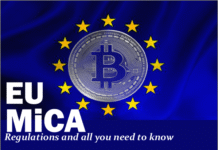Cryptocurrency transactions worth more than 600,000 rubles (approximately $8,000) must be declared; otherwise, they may be considered a criminal act.
Cryptocurrency is a digital payment system that doesn’t rely on banks to verify transactions. It’s a peer-to-peer system that can enable anyone anywhere to send and receive payments. … Cryptocurrency is stored in digital wallets. Cryptocurrency received its name because it uses encryption to verify transactions.
According to a Tuesday announcement, Russia’s government and central bank have reached an agreement on how to regulate cryptocurrencies.
Russia’s government and central bank are currently working on a draft law that will define cryptocurrency as a “analogue of currencies” rather than digital financial assets, with the launch date set for February 18. Cryptocurrencies would only be able to operate in the legal industry if they were fully identified through the banking system or licensed intermediaries.
According to Kommersant, Bitcoin (BTC) transactions and cryptocurrency possession are not prohibited in the Russian Federation; however, they must be done through a “digital currency exchange organizer” (a bank) or a peer-to-peer exchange licensed in the country.
The report also states that cryptocurrency transactions worth more than 600,000 rubles (approximately $8,000) must be declared; otherwise, they may be considered a criminal act. Those who accept cryptocurrencies illegally will face fines.
Related post: Cryptocurrency regulation is a big topic as Russian and Indian rules take shape
This announcement comes after months of speculation about how the Russian government will deal with digital currencies. While it is unclear what this decision will mean for Russian businesses and citizens, it appears that the country is gradually warming up to the idea of cryptocurrencies.
In a report released in January, the Bank of Russia called for a nationwide crypto ban, warning about the industry’s speculative nature. As part of the proposal to ban digital assets, the bank also stated that financial firms should not facilitate crypto transactions.
The proposal, however, was met with opposition from Russia’s Ministry of Finance. A few days after the central bank’s call for a ban, a ministry official, Ivan Chebeskov, stated that the government should regulate cryptocurrency rather than outright prohibit it. He warned that a total ban would cause Russia to fall behind in technology.
According to reports, President Vladimir Putin supports efforts to regulate the country’s crypto mining industry.




















